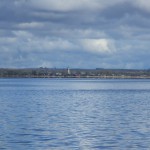Lake Nero (Rostov Veliky)
Lake Nero is a natural attraction of Rostov Veliky (Rostov the Great). Its water-surface area is a little over 50 square kilometers. There are two islands on the lake – Lvovsky (Lesnoy) Island and Rozhdestvensky (Gorodskoy) Island. This lake is one of the oldest on the territory of Russia; scientists estimate its age to be close to five hundred thousand years. Lake Nero was formed in the pre-glacial period.
The lake is shallow, its depth on the average is not deeper than 3 meters; the bottom is covered with a thick layer of silt sapropel – centuries-old bottom sediments, formed of plants and remains of living organisms. The shores of the lake are low and boggy.
People inhabited the lands around Lake Nero from the ancient times. The first settlers who came to dwell in this area were the Finno-Ugric tribe of Merya. There are several versions concerning the origin of the lake’s name, but virtually all of them agree that it has Meryan roots. According to one version, this name means a marshy place, marshland; according to another version, the word ner means water. By the way, the name of the Neva River has the same roots.
People’s tradition also has something to say on this subject. So, according to one of the legends, there is a secret negation of the city’s name hidden in the lake’s name – Not Rostov. One wicked man from the foreign lands roamed in the local forests in search of Rostov; when he came upon the lake’s shore and saw a city he wanted to say that it was not Rostov, but he could not finish the sentence, because an arrow shot by a smart Rostov man pierced him.
According to another – more romantic version, there was a certain prince, who had a daughter named Nera, and there was a knight named Zvenislav who was in love with her. Nerawaskidnappedbyawickedwitch. To bring her back, the knight realized the most logical plan of all that one could think of – he brought to the spot where Rostov is now standing the dirt out of which the first man was created, and cast it into the lake that had no name until then. An island was formed from that dirt, upon which the knight found his beautiful Nera whose name was given to the lake as a reminder of the miraculous find.
The lake also has a second name of the same Merya origin – Kaovo. The situation with this name is similar – there are several versions concerning its origin. According to one of them, Kaovo is a place where seagulls live. According to another version, this name means first mother which indicates the firstborn significance of the lake – it is the chief lake, the senior lake.
Upon the lake’s shores and around it there were many Meryan villages, the biggest one of which was the Sarskoye Gorodishche. Unfortunately, no valuable monuments have remained that would remind of those times. To our days only their names survived: they are the Ishnya River and the same-name village Ishnya, the Sara River, and villages Shulets and Sulost, and many more.
Supposedly, in the IX century, the East Slavs came to replace the Merya at the lake, and they founded Rostov city on its shores that soon acquired the additional title Veliky (the Great). Apparently, for some time the two peoples co-existed peacefully, and intermingled until the full assimilation of the smaller ethnic group by the larger one.
Despite its shallow waters, the lake is navigated. The first steamer was launched on it in 1883 and it was named “Yemelian.” In our days, from an improvised pier which is located behind the main entrance to the Rostov Kremlin, two excursions boats make their voyages. There is a good view from the lake of the main attractions of Rostov Veliky – the Rostov Kremlin, Spaso-Yakovlevsky Dmitriev Monastery and Bogoyavlensky Avraamiev Monastery.
The lake is rich with fish; it is inhabited by bream, perch, pike, pike-perch, roach, orfe, and common rud. The industry in Rostov have never been well developed, and in recent years it has completely died, so there is nothing and no one to actually do any damage to the lake’s ecological environment. And the gracious lake rewards local fishermen for this fact with rich hauls of fish.
This material has been taken from the following web-resource: http://www.explorado.ru

